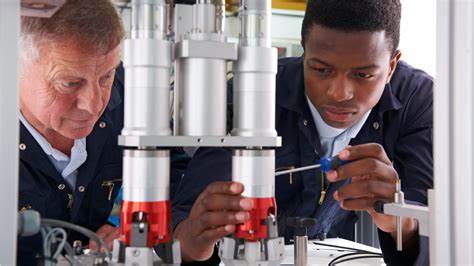Table of Contents
Introduction
Becoming an instrumentation engineer in India can be an exciting and rewarding career choice. Instrumentation engineers play a crucial role in designing, developing, and maintaining various instruments and control systems used in industries such as manufacturing, energy, healthcare, and more. This article will guide you through the steps and qualifications required to embark on this promising career path.
What is Instrumentation Engineering?
Instrumentation engineering involves the application of principles from various fields like electronics, electrical, and measurement to design and develop instruments used for monitoring, controlling, and measuring processes in different industries. These engineers work on cutting-edge technologies to ensure the precision and accuracy of instruments and control systems.
Educational Requirements
To become an instrumentation engineer, a strong educational foundation is essential.
Pursue a Bachelor’s Degree
The first step is to obtain a bachelor’s degree in instrumentation engineering or a related field. Most universities and technical institutions in India offer a Bachelor of Technology (B.Tech) or Bachelor of Engineering (B.E) in Instrumentation Engineering. During this four-year undergraduate program, students gain theoretical knowledge and practical skills required for the profession.
Consider Specialization
While pursuing a bachelor’s degree, students may choose to specialize in specific areas within instrumentation engineering, such as process control, industrial automation, or robotics. Specialization can open up niche job opportunities and enhance career prospects.
Higher Education Opportunities
For those aiming for advanced positions and research opportunities, pursuing a master’s or doctoral degree in instrumentation engineering or related fields is beneficial. Higher education provides in-depth knowledge, research exposure, and expertise in specialized areas.
Gain Relevant Skills
In addition to formal education, certain skills are crucial for becoming a successful instrumentation engineer.
Technical Skills
Instrumentation engineers should be proficient in programming languages, such as C, C++, and Python, as well as have a strong understanding of electronics, control systems, and sensors. Knowledge of software tools like MATLAB and LabVIEW is also valuable.
Problem-Solving Skills
Solving complex problems and troubleshooting issues are integral to this profession. Developing analytical and critical thinking abilities is vital for an instrumentation engineer.
Communication Skills
Effective communication is essential to collaborate with multidisciplinary teams and present ideas clearly. Instrumentation engineers often work alongside professionals from different domains.
Internships and Practical Experience
Gaining practical experience is invaluable for aspiring instrumentation engineers.
Internship Opportunities
During their academic years, students should actively seek internships with reputable companies in the industry. Internships offer hands-on experience, exposure to real-world challenges, and the chance to network with professionals.
Projects and Research Work
Undertaking projects and research work during academic years or internships helps in showcasing problem-solving abilities and innovation. It also adds weight to the resume when applying for jobs.
Stay Updated with Industry Trends
To thrive as an instrumentation engineer, staying up-to-date with industry trends and advancements is crucial.
Join Professional Associations
Joining professional organizations such as the Instrumentation, Systems, and Automation Society (ISA) or the Institution of Engineers (India) can provide access to resources, conferences, and networking opportunities.
Attend Workshops and Seminars
Attending workshops, seminars, and webinars keeps engineers informed about the latest technologies and best practices in the field.
Job Opportunities in Instrumentation Engineering
Instrumentation engineers have diverse career opportunities. They can work in industries like oil and gas, pharmaceuticals, aerospace, and more. Roles include control systems engineer, automation engineer, process engineer, and instrumentation design engineer.
Salaries and Benefits
Instrumentation engineering offers attractive salary packages, especially with relevant experience and expertise. Benefits often include health insurance, retirement plans, and other perks.
Advancement and Growth
With experience, instrumentation engineers can advance to managerial roles, lead teams, or even become consultants. Continuous learning and skill development are key to career growth.
Challenges Faced by Instrumentation Engineers
Like any profession, instrumentation engineering comes with its challenges. These may include meeting project deadlines, adapting to rapidly changing technologies, and working in hazardous environments.
Future Outlook
The future for instrumentation engineers in India is promising, with increasing demand in sectors like renewable energy, automation, and healthcare. Advancements in Industry 4.0 and Internet of Things (IoT) will further create opportunities.
Conclusion
Becoming an instrumentation engineer in India requires dedication, a strong educational background, and continuous skill development. By pursuing a relevant degree, gaining practical experience, and staying updated with industry trends, aspiring engineers can pave the way for a successful and fulfilling career.
FAQs
Q1. What is the minimum educational requirement to become an instrumentation engineer?
A. To become an instrumentation engineer, a bachelor’s degree in instrumentation engineering or a related field is required.
Q2. Is it necessary to specialize in a particular area within instrumentation engineering?
A. Specialization is not mandatory but can enhance career prospects by opening up niche job opportunities.
Q3. How important are technical skills for instrumentation engineers?
A. Technical skills are crucial for instrumentation engineers, as they work with various technologies and control systems.
Q4. What benefits can internships provide for aspiring instrumentation engineers?
A. Internships offer hands-on experience, exposure to real-world challenges, and networking opportunities.
Q5. What are the future prospects for instrumentation engineers in India?
A. The future for instrumentation engineers in India is promising, with increasing demand in sectors like renewable energy, automation, and healthcare.




